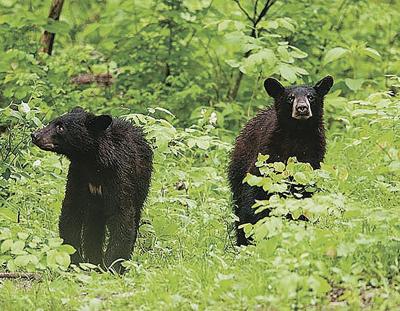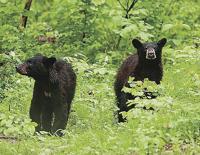Because it seems spring started at the end of February, not surprisingly it feels like summer already, and wildlife encounters you wouldn’t expect until Memorial Day are already on the radar. Jefferson County conservation agent Cpl. Lexis Wilson said she received a call last week from someone curious about the potential for bear sightings. Historically that hysteria starts up in late May or early June.
We hadn’t seen any black bears in these parts for more than 100 years, but a restored population in the southern third of Missouri has started a new trend. Over the past 10 years at least one bruin has wandered through our area each spring. In most cases they return to the more remote woods of the Ozark highlands when they find our accommodations less than appealing. Wilson says residents need to make sure we keep it that way.
“I’ve made these bears my mission,” she said. “Email, call or text anytime you have information to share. As long as it is not causing any trouble, we just want to know about it. If one gets into your trash one time and moves on, that is not a nuisance bear.”
Our local conservation agents are the first place to turn for concerns or if you suspect a bear or bear damage on your property. You can call or text Wilson at 314-696-9425 or agent Ben Bardot at 314-954-5697. Send email to lexis.wilson@mdc.mo.gov or benjamin.bardot@mdc.mo.gov.
“They are like teenage boys,” Wilson said. “They are always looking for something else to eat. Take down your bird feeders and stop feeding squirrels or other critters.
“Bears are like very large raccoons. Anything that smells like food is going to get their attention.”
The other misinformation Wilson and Bardot work hard to dispel is the danger of the annual bear visits. They are not going to hurt people or pets as long as we learn to live with their presence during their short visits.
“They are just bears being bears, looking for food and new homes,” Wilson said. “They are docile by nature and want to avoid interaction with people.”
Another reliable resource to learn more about our bears is bearwise.org, a group of wildlife agencies and national experts. It provides trustworthy information and regular updates through an email newsletter. The March edition mentioned the potential for early-bird bears.
“The (National Weather Service) reports that after a strong El Nino helped produce the warmest winter on record in the lower 48 states, spring is arriving up to three weeks early in much of the country,” the newsletter stated. “Below-average snowfall, warmer temperatures and an early start to the growing season has bears across much of the country waking up early as well, and looking for food.”
That’s the key to protecting bears from us. Don’t provide easy-to-find food sources for them. Our conservation agents and the wildlife biologists at bearwise.org offer the same important tips.
■ Store garbage inside a secure building until trash pick-up day.
■ Keep your grill clean, covered and indoors if possible when not in use.
■ Don’t leave food for pets, strays or other animals outside. Feed pets a portion at each meal and remove the empty containers.
■ Refrain from using bird feeders in bear country from April through November.
■ Use electric fencing to keep bears away from beehives, chicken coops, vegetable gardens, orchards, and other potential food sources.
“Bears have great memories, so bears that learned to rely on high-calorie, human-provided food sources last year make a beeline for the bounty,” the bearwise.org April newsletter stated. The site also offers free downloadable documents to “Attract Birds, Not Bears,” and checklists to make sure your home and travels are bear-prepared.
John Winkelman has been writing about outdoors news and issues in Jefferson County for more than 30 years and was the Associate Editor for Outdoor Guide Magazine. If you have story ideas, e-mail ogmjohnw@aol.com, and you can find more outdoor news and updates at johnjwink.com.




